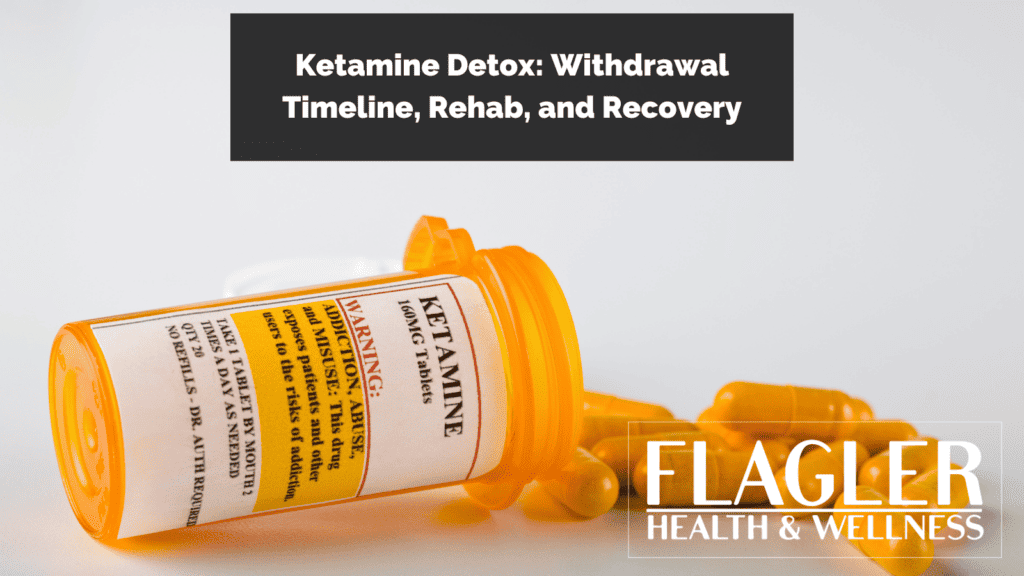Ketamine withdrawal occurs when a person who has been using ketamine regularly suddenly stops or reduces their intake. Unlike other substances like alcohol or opioids, ketamine withdrawal is often characterized by psychological symptoms rather than physical ones.
Common symptoms of ketamine withdrawal include depression, anxiety, irritability, shakiness, and cravings for the drug. In some cases, individuals may experience disorientation and a break from reality. Ketamine withdrawal symptoms are caused by the brain’s adjustment to the absence of the drug.
Regular use of ketamine can alter the brain’s neurochemistry, leading to a physical and psychological dependence. When ketamine use is reduced or stopped, the brain struggles to adapt, leading to withdrawal symptoms.
The effects of Ketamine withdrawal can be both psychological and physiological. Users may experience an intense craving for the drug, mood swings, changes in perception, and cognitive difficulties. Long-term effects include persistent changes in mood and thought patterns.
Difference Between Ketamine Withdrawal and Ketamine Detox?
Ketamine withdrawal is about the symptoms that occur when someone stops or reduces their use of ketamine, while ketamine detox refers to the process of removing the drug from the body.
Ketamine Withdrawal
Withdrawal refers specifically to the range of symptoms an individual experiences after reducing or stopping the use of ketamine. These symptoms are primarily psychological, including depression, anxiety, irritability, and an intense craving for the drug. Withdrawal symptoms occur because the body and brain have become accustomed to the presence of ketamine, and its sudden absence creates a physiological and psychological imbalance.
Ketamine Detox
Detox on the other hand, is a broader process that involves medically assisted management of the withdrawal symptoms as well as the physical removal of the drug from the body. Detox is typically carried out under medical supervision, either in a hospital or a specialized detox facility. The goal of detox is to safely manage the acute physical and psychological effects of stopping drug use.
What is the Cause of Ketamine Withdrawal?
The causes of ketamine withdrawal are primarily linked to how the drug interacts with the brain’s neurotransmitters. Regular use of ketamine can disrupt the normal functioning of these neurotransmitters, leading to a physical and psychological dependence.
- Disruption of Neurotransmitter Balance: Ketamine primarily acts on the brain’s neurotransmitters, particularly glutamate and NMDA receptors. Regular use of ketamine can significantly alter the natural balance of these neurotransmitters.
- Physical Dependence: Over time, the body becomes accustomed to functioning with ketamine’s influence. This dependence is a physiological state where the body requires the drug to function normally.
- Psychological Dependence: Ketamine can also lead to psychological dependence, where users feel a strong desire or compulsion to take the drug to experience its effects or to avoid withdrawal symptoms.
- Impact on Reward and Motivation Pathways: Regular ketamine use can affect the brain’s reward and motivation pathways, leading to cravings and a drive to continue using the substance despite negative consequences.
Symptoms of Ketamine Withdrawal During Detox
People may experience a range of physical and psychological symptoms during detox. These symptoms can vary in intensity and duration, depending on factors such as the length and amount of ketamine used, individual physiology, and the presence of co-occurring mental health conditions. Common symptoms include:
Psychological
- Anxiety and panic attacks
- Depression, potentially severe
- Intense cravings for ketamine
- Irritability and mood swings
- Confusion and cognitive difficulties
- Hallucinations
Physical
- Sweating and chills
- Increased heart rate
- Nausea and gastrointestinal upset
- Insomnia and sleep disturbances
- Tremors or shakiness
It’s important to note that these symptoms can be quite distressing and, in some cases, may pose psychological risks. Medical supervision during detox is crucial to manage these symptoms safely and effectively. The detox process is designed to help the body rid itself of the drug as well as stabilize the individual’s mental state, paving the way for further treatment and recovery.
When Does Ketamine Withdrawal Start?
Ketamine withdrawal can start within a few hours to several days after the last dose, depending on the individual’s history of drug use.
What are the Effects of Ketamine Withdrawal (Long Term and Short Term)?
Ketamine, a drug primarily used for anesthesia but also misused recreationally, can lead to dependence and withdrawal symptoms when used frequently or in high doses. The effects of ketamine withdrawal can be categorized into short-term and long-term effects, as follows:
Short-Term Effects
- Anxiety: Increased feelings of nervousness and unease.
- Depression: Sudden onset of depressive symptoms, including feelings of sadness, emptiness, or hopelessness.
- Cravings: Strong desire to use ketamine again to alleviate withdrawal symptoms.
- Physical Discomfort: Symptoms like sweating, increased heart rate, tremors, and nausea.
- Insomnia: Difficulty in falling or staying asleep.
- Disorientation and Confusion: Users may feel disoriented or have trouble concentrating.
Long-Term Effects of Ketamine Withdrawal
- Persistent Mood Disorders: Long-term withdrawal can lead to ongoing emotional and psychological issues.
- Depression: Can persist well beyond the acute withdrawal phase, sometimes requiring clinical intervention.
- Anxiety Disorders: Chronic anxiety or panic disorders may develop.
- Cognitive Impairments:
- Memory Loss: Difficulty in forming new memories or recalling past events.
- Impaired Executive Functioning: Problems with planning, organizing, and decision-making.
- Reduced Attention Span: Difficulty in maintaining focus on tasks.
- Social and Behavioral Changes:
- Social Withdrawal: Tendency to avoid social interactions, leading to isolation.
- Changes in Personality: Noticeable shifts in personality traits or behaviors.
- Potential for Relapse:
- Due to the discomfort of long-term withdrawal symptoms, there’s a heightened risk of relapse.
Both short-term and long-term withdrawal symptoms can significantly impact an individual’s quality of life and functioning, highlighting the importance of seeking professional help for ketamine addiction and withdrawal management.
How Long Does Ketamine Withdrawal Take During Detox?
The duration of ketamine withdrawal varies, but it typically lasts from a few days to several weeks. The timeline can be influenced by factors such as the amount and frequency of ketamine use, the presence of any co-occurring mental health conditions, and polydrug use. The typical timeline for ketamine withdrawal is as follows:
Initial Phase (24-72 hours after last use): Onset of acute withdrawal symptoms, which can include anxiety, depression, cravings, insomnia, and physical symptoms like sweating and increased heart rate.
Peak Phase (3-5 days after last use):Symptoms typically reach their peak. This phase is often the most challenging in terms of physical and psychological discomfort.
Subsiding Phase (1-2 weeks): Gradual reduction of acute symptoms. Emotional and psychological symptoms may still be present but typically lessen in intensity.
Extended Withdrawal Phase (up to several weeks): Some individuals may experience a protracted withdrawal phase, particularly if they have been using ketamine heavily or for an extended period. This phase can include lingering mood disturbances, cognitive issues, and cravings.
Post-Acute Withdrawal Symptoms (PAWS)
- Longer-Term Effects: Some individuals may experience PAWS, where symptoms like anxiety, depression, and cognitive impairments continue for months after stopping ketamine.
- Intermittent Nature: PAWS symptoms can come and go and may be triggered by stress or environmental factors.
What Influences Ketamine Withdrawal and Detox Timeline?
Factors include the duration and intensity of ketamine use, individual health, and whether other substances are involved.
What Happens During Ketamine Withdrawal?
During withdrawal, individuals may experience a range of psychological and physical symptoms as the body readjusts to functioning without ketamine. The withdrawal experience can vary significantly from person to person, influenced by factors such as the duration and intensity of ketamine use, individual physiology, and overall health.
Factors that Affect Ketamine Withdrawal
Ketamine withdrawal is a complex process influenced by a multitude of factors. Each individual’s experience can vary significantly based on several key elements. Understanding these factors can help in better preparing for and managing the withdrawal process.
By considering these factors, individuals and healthcare providers can develop a more personalized and effective approach to managing ketamine withdrawal. This tailored approach is crucial for ensuring a safer and more successful detox and recovery process. Some of the primary factors include:
- Individual’s Overall Health: Pre-existing medical conditions can exacerbate withdrawal symptoms, while being in good physical health can make the process less intense.
- Length of Drug Use: Longer periods of ketamine use typically result in more severe withdrawal symptoms.
- Method of Use: The method by which ketamine is consumed (snorting, injecting, etc.) can affect the intensity of withdrawal. People who inject ketamine, for example, may experience different or more severe withdrawal symptoms compared to those who snort the drug.
- Dosage: Higher and or more frequent doses of ketamine lead to more intense withdrawal symptoms.
- Co-occurring Mental Health Disorders: Disorders such as depression, anxiety, or psychosis can intensify withdrawal symptoms.
- Age and Metabolism: Younger individuals with faster metabolisms may process the drug out of their systems more quickly, potentially altering the withdrawal timeline.
- Usage of Other Substances: Concurrent use of other drugs or alcohol can complicate withdrawal, leading to more complex and potentially dangerous symptoms. Polydrug use can also mask or alter the symptoms of ketamine withdrawal.
How to Treat Ketamine Withdrawal
Treating ketamine withdrawal begins with addressing the symptoms, which may require medical supervision and medication assisted treatment (MAT). Other treatment strategies may include:
- Therapy: Talk therapy, such as Cognitive Behavioral Therapy (CBT), can help address the psychological aspects of ketamine addiction and withdrawal.
- Detox Programs: Inpatient programs offer a structured and intensive treatment environment with round-the-clock care. Outpatient programs allow individuals to live at home while attending treatment sessions, suitable for those with milder symptoms or strong support systems.
- Rehabilitation Programs: Long-term rehabilitation programs can provide extensive support, including therapy, life skills training, and relapse prevention strategies.
- Holistic Therapies: Complementary therapies such as acupuncture, yoga, meditation, and art therapy can be beneficial in managing stress and promoting overall well-being.
Ketamine withdrawal treatment is most effective when it is personalized to the individual’s specific needs and circumstances. A combination of these treatments can provide a comprehensive approach, addressing the physical, psychological, and social aspects of withdrawal and paving the way for a successful recovery journey.
Treatment Plan for Ketamine Withdrawal During Detox
A comprehensive plan may involve therapy, support groups, and possibly medications to manage specific symptoms like depression or anxiety.
Can You Die from Ketamine Withdrawal?
While ketamine withdrawal is typically not life-threatening, it can lead to severe depression and suicidal thoughts, making medical supervision crucial. The primary dangers arise from the psychological impact of withdrawal rather than physical symptoms. Here’s a closer look:
Psychological Impact
- Severe Depression: One of the most serious risks of ketamine withdrawal is the onset of severe depression. This can be particularly intense for individuals who have used ketamine to self-medicate for pre-existing depression.
- Suicidal Thoughts and Behaviors: The intensity of depressive symptoms during withdrawal can lead to suicidal ideation or attempts. This risk underscores why withdrawal should be monitored by healthcare professionals.
Indirect Risks
- Risky Behavior: The psychological distress experienced during withdrawal may lead to impaired judgment and risky behaviors, which can indirectly increase the risk of harm or death.
- Relapse and Overdose: The discomfort of withdrawal can lead to relapse, where the risk of overdose is heightened, especially if tolerance has decreased.
Importance of Medical Supervision
- Monitoring and Support: Supervised detox can ensure that any concerning symptoms are promptly addressed, reducing risks associated with severe depression and suicidal thoughts.
- Medications and Therapies: In a medical setting, medications and therapies can be provided to help manage depressive symptoms and reduce the risk of severe outcomes.
Can Ketamine Withdrawal Cause Seizures?
While seizures are not typically a common symptom of ketamine withdrawal, there are circumstances where the risk may be elevated:
Factors Increasing Seizure Risk
- Pre-Existing Conditions: Individuals with a history of seizures or epilepsy are at a higher risk and should be closely monitored during the withdrawal process.
- Polydrug Withdrawal: If ketamine has been used in conjunction with other substances that have a higher risk of seizure during withdrawal (such as alcohol or benzodiazepines), the risk of seizures may increase.
Monitoring and Prevention
- Medical Assessment: A thorough medical assessment prior to detox can identify risks related to seizures.
- Supervised Detox: Undergoing detox in a medically supervised setting ensures immediate medical intervention in case of seizures or other complications.
- Gradual Tapering: In some cases, a gradual tapering off ketamine, rather than abrupt cessation, might be recommended to minimize the risk of seizures, especially in high-risk individuals.
How to Cope with Ketamine Withdrawal
Coping with ketamine withdrawal usually requires multiple forms of support, which can range from professional medical advice to implementing healthy lifestyle changes. Here are some strategies to consider:
- Rehab and medically supervised detox: Consult with an addiction professional who can help you manage withdrawal symptoms safely.
- Mindfulness Practices: Techniques like deep breathing, meditation, yoga, and regular exercise can help you cope with stress without turning to ketamine.
- Building a Strong Support Network: Consider joining a support group or online community of individuals going through the same journey. Connecting with others who understand your struggles can be immensely helpful.
- Identifying Triggers: Recognize the situations, emotions, or habits that trigger your cravings for ketamine. Common triggers include stress, social situations, and specific routines.
Get Help At Flagler
At Flagler, we offer a range of treatment options to assist individuals struggling with ketamine addiction. From the initial detox phase to ongoing therapy and support, we are committed to providing compassionate and effective care tailored to each individual’s needs. Our treatment programs utilize a combination of modalities and support c to help you recover from addiction and build a strong foundation for the life you’d like to lead. No matter where you are on your recovery journey, there is always help available. Reach out to us today for more information about how our heroin treatment programs can help you or a loved one.
Share This Post







